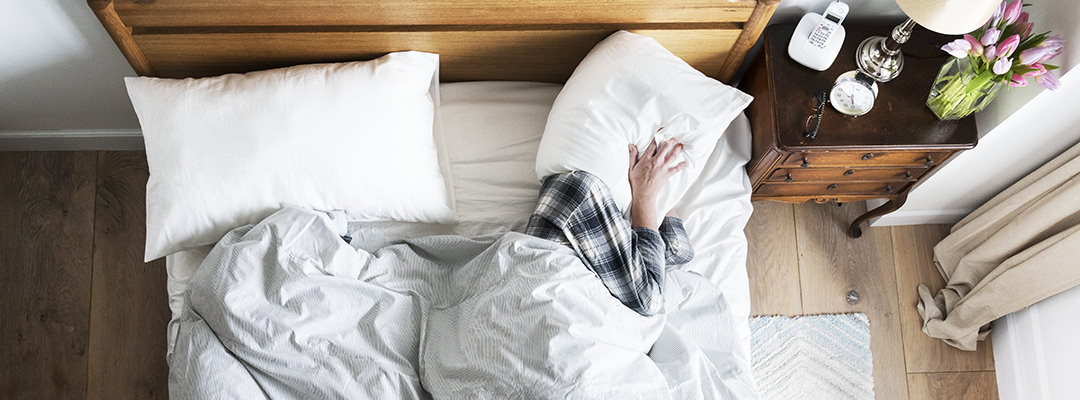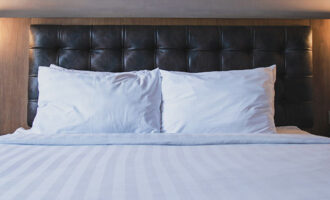Whether your neighbors are up late having a celebratory bash, or you happen to live in a high-volume area with a lot of nighttime ruckus, losing out on sleep because of a noisy environment is nobody’s idea of a good time. We all know that poor sleeping habits have a slew of negative repercussions on our physical, emotional, and mental well-being. Being woken up by noises at night makes it even harder to function at our best during the day.
We can’t always control the actions of others in the world around us, but we can take certain steps to try and improve the quality of our sleep while things are still happening nearby. Let’s look at how and why noise affects our sleep, and steps we can take to look after our health and rest a little easier during the night.
How does noise affect our sleep?
Even if we spend a long time in bed grabbing snatches of sleep where we can, breaking up our rest into smaller bites is a lot less healthy than a solid eight hours.
During our sleep cycle we fluctuate between lighter and deeper sleep, depending on our brain activity in that moment. During our lighter sleep cycles we’re more likely to be woken by external noises; however, we can be jolted out of our sleep at any time. What’s even more surprising is that while we’re asleep, our brains are still doing their best to take care of us by staying aware of what’s going on in our environment. That means that we’re still acknowledging and processing noises around us while we’re asleep, even if we’re not conscious of it.
At one point in our history this would have been a good thing; we would have wanted to make sure that we could wake up and get moving quickly if, for instance, we heard a sabertooth tiger sniffing around the entrance to our cave. Even today there are some situations in which being aware of the sounds around us is integral to our safety. However, this evolutionary instinct becomes problematic when it inhibits us from getting a good night’s sleep. Hearing noises at night causes our brains to be conflicted about what it needs as it does its best to take care of our bodies in two contradictory ways.
Why is sleeping through noise harder for some than others?
Have you ever noticed that you might be woken from the slightest creak of a floorboard, while your housemate can sleep through a monsoon? There’s a reason for that, and it has to do with our individual brain activity.
In a neuroscience study by Current Biology, researchers from Harvard Medical School studied a number of participants and monitored their brain activity as they slept. They were particularly interested in sharp bursts of high-frequency brainwaves they called “sleep spindles”. They believed that these bursts were being produced to temporarily block out sensory information.
Through the study, they exposed the sleepers to an increasing volume of environmental noise. They discovered that people whose brains produced more of these “sleep spindles” were much less likely to be disturbed by outside noise. People who experienced less sleep spindle activity, by contrast, would wake up either fully or partially when they heard noises around them.
Sometimes the participants wouldn’t even be aware that their sleep had been disrupted, suggesting that these stimuli might have a larger negative effect on our sleep than we might consciously realize.
On a more basic level, people might sleep easier through external noises if they’ve grown accustomed to it over time. Someone who grew up in a big city, for instance, might be more desensitized to environmental noises than someone who grew up in a quiet countryside. One of the ways our brains take care of us is by being very adaptable, and they’ll try to find ways to give us the best sleep they can in the world we live in.
How can we sleep easier through noise at home?
We always want our homes to feel like a safe and healthy place, and that means getting a restful night’s sleep. Here are a few things you can try when you need to sleep a little quieter.
Earplugs
Earplugs are a tried and true method of canceling out environmental noises. You can get foamy ones pretty cheap from a pharmacy that adapt to the shape of your ear without leaving any residue behind. These earplugs are made from “slow-recovery” foam, which means you can squish them up before putting them inside your ear, and then hold them as they expand back out to fill the entire space. This means they’ll cancel out as much noise as possible without sacrificing comfort.
Because we’re living in the age of Smart everything, you can also get earplugs that have advanced beyond the classic memory foam option. Now there are special noise-canceling earbuds that create contrasting sound waves to cancel out the noise in your area; you can also find earbuds specifically designed to emit white noise as you fall asleep. Whatever your needs, there’s an earplug option for everyone.
White noise
Some people find it as difficult to sleep in total silence as they do in a noisy situation, so white noise is a perfect solution. White noise is a low, neutral sound that’s played at varying frequencies at the same time. This essentially creates a blanket of sound that blocks out any abrupt changes in the sound frequencies of your ambient space, such as a slamming door or chatty neighbors.
Simple white noise devices are things like fans, hairdryers, and TV static which produce a calming ambient noise. You can also get electric white noise devices and mobile apps, specifically designed to produce the best balance of sound frequencies to block out other sounds and lull you into a peaceful, healthy sleep.
Calming music
If you’re trying to cancel out the distracting noise around you, a calming playlist might be the way to go. This could be soft, relaxing music, or it could be pleasant ambient sounds such as the waves of the ocean or the rustle of wind in the trees. Many apps have an enormous library of songs and sounds to choose from, so there’s a perfect pitch for everybody.
This technique works on a similar theme as white noise devices. When you play music that makes you feel peaceful, you won’t be able to hear all those late-night parties and backfiring cars that disrupt your precious sleep.
Use noise blockers in your sleeping space
Thin walls, floors, and ceilings can be a detriment to peace and quiet, particularly in older apartment buildings. If you’re suffering a lot of background noise from your neighbors, try using soundproofing and muffling techniques in your bedroom.
Carpeting always absorbs more noise than hardwood; if noise is a real issue, try replacing your floorboards with soft carpeting. If you can’t pull up the floors of your living space, or if you don’t want to make a permanent change, large area rugs work just as well. You can also use towels and other soft material around the edges of doors to block out sounds from outside the room. To lessen noise coming from outside, try using heavy curtains across your window to absorb sounds before they enter the room.
Rearrange your furniture
If you’re having trouble with noise coming from a specific area, such as the apartment next door or the busy intersection outside, try moving your bed away from the source. Keep your head towards where the room is quieter. You can also try to keep heavier furniture, such as wardrobes, against walls where more noise passes through to absorb some of the sound. Keeping a large area rug under your bed will also help dull some of the noise as it tries to come through.
Communicate where possible
Sometimes, nighttime peace and quiet is as simple as a polite conversation. If you live in an old building and your neighbors are making a lot of noise, it’s very likely they simply don’t realize how much sound is passing through the walls. Try talking to them and seeing where you can come to a middle ground that works for everybody.
If your noise concerns are coming from construction work or from a business, try reaching out to officials in your area and seeing what sort of noise laws are in place during the later hours of the evening. Most people are willing to work together towards a peaceful neighborhood community.
What are some tips for a peaceful sleep while traveling?
If you’re on holiday or traveling for business, a poor night’s sleep is the last thing you want to spend your time worrying about. Here are a few things to keep in mind when sleeping in your home away from home.
Research the neighborhood
When you’re looking at a hotel to stay at, make sure you look at the neighborhood in which it’s situated. Google Maps is great for this, as are sites like TripAdvisor and Reddit. See if you can get a sense of what the street is like, what major intersections are close by, and what sort of businesses are in the area. Also check out if any schools are in the neighborhood, and what age group. These details will give you an idea of what to expect when you stay.
Request a quiet space
If you’re staying in a place with multiple options, such as a hotel, see if you can request a room in a quieter area. Rooms that are facing the back of the building and rooms that are away from common areas, such as restaurants, tend to be more peaceful. If you communicate your needs with the hotel staff in advance (ie., not five minutes before you check-in), you’ll find them more than happy to accommodate you to the best of their ability.
Travel with earplugs
If you’re traveling to a new place and aren’t sure what to expect, it’s never a bad idea to bring earplugs along. As we saw above, earplugs come in all different varieties to suit every need. Plus, they’re lightweight and super easy to throw into your handbag. Keep a few nearby so that you’re ready for anything.
Did you like it?4.5/5 (30)





